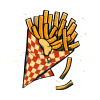

Literary Fiction
D
avid loved untaxed Bauhaus steel. Especially when it was at a Vancouver 6.7 percent discount. If he included the security envelope with fifty one-dollar bills, the total cost of two coffee tables, a new kitchen table, and matching bedside lamps was $9,650. Sure, his five-year-old daughter, Elise–who he’d coached not to say a word about the furniture–likely wouldn’t look back on the adventure fondly even though it would make her adult self more interesting. In David’s opinion, as an adult who struggled with party chat, being interesting was a skill you couldn’t learn, so she could thank him later.
His partner Daphne, on the other hand, wanted the record to show she’d explicitly not agreed to any of it.
“If the border patrol takes us into separate interrogation rooms, I’m telling the truth and getting out of here with my daughter,” she said to him as they loaded the car.
It had not been lost on David that Daphne had spent the last half hour in the passenger seat of their 1995 Honda Passport with her arms crossed in front of her chest, her nails making white and then red indents into the crook of her elbows. She wouldn’t look at him and instead looked straight out the windshield at the other side of the border.
If David thought about it, her reaction was fair enough. So he tried not to think as they pulled up to the checkpoint.
He cranked down the window and handed the officer their passports, the envelope tucked behind. At least he knew not to bribe in Canadian dollars; the food was rumored to be better on the American side.
“Purpose of your visit?” the officer asked.
That morning, David had rehearsed this moment five times in the hotel’s makeup mirror. During the run-through, he’d seen two nose hairs peeping from his left nostril. Something he needed to remember to fix when he got back. His fingers flexed on the steering wheel, and he breathed deeply.
“Le Crocodile’s shoestring fries,” he replied. “You know, the one in city center?”
It was a clear out, a spot popular with the Canadians and Americans alike, and while he did not eat fries himself, his daughter had assessed their worth by demolishing a plate the size of her head. He hoped when she went to therapy later in life to recover from the whole experience, she’d remember he’d let her have the fries when other parents did not.
“Shoestring fries?”
Sweat bloomed beneath David’s arms, and it smelled of old bread. He nodded.
“Wait here,” the officer said. He headed towards the main building.
This didn’t look good. What if he never got to hear a teenage Elise explain Bauhaus’s style to her artsy Brooklyn friends as not terrible and brutalist?
“Are we in trouble?” Elise asked from the back, her voice small, her shoulders curling in on herself.
“I knew this would happen,” Daphne hissed. “The coffee tables were overkill. We should have just stuck with the one for the kitchen.”
“The mismatch would have driven you crazy,” he replied and watched Elise nod solemnly in agreement in the rearview.
Daphne glared at him and didn’t say anything.
“Well,” David replied. “Either we’ll be scrubbing drink rings out of them for years to come, or he will.”
Maybe he could blow through the turnstile. Leave Canada behind. It wouldn’t matter if they could never come back to get the matching geometric chairs.
Two officers returned.
“This the guy?” The second asked.
“Tell him,” the first said.
“I’m sorry?” David asked.
“About the fries. That they’re why you visited,” the first said.
“Oh yeah,” David said. “Whole reason we came. Right, Elise?”
“Yup!” she warbled.
“I told you,” the first exclaimed. “And he’s American!”
Had his body not been in crisis mode, David would have wondered what they were trying to say other than making a cheap junk food joke. If the extra wait, the extra officer, was really about his chosen currency. His fingers were so slick they threatened to slip from the wheel. Laugh, do whatever you need, he wanted to say, as long as you let us go. Instead, he offered a smile and nodded, his lips crackling lines across his cheeks.
The second rolled his eyes, waved David through. He put the car back into drive and kept well under the speed limit for the first thirty miles. Elise asked for fries every few minutes.
“You can have all the fries you want when you get home, sweetie,” he said. “But they might not be the same.”
“Trying to get us thrown in jail and give our daughter cholesterol?” Daphne asked. “I don’t think I’m going to set foot in Canada ever again.” But her shoulders had softened, and by the time they made it to Spokane, her arms had uncrossed.
It took him until they were in Seattle to notice the envelope was gone. And even though he didn’t say it to Daphne, he wondered if, perhaps, it had made the difference after all.

Author Bio

Salena Casha’s work has appeared in over 100 publications in the last decade. Her most recent work can be found on Flash Frog and Ghost Parachute. She survives New England winters on good beer and black coffee. Visit her at salenacasha.substack.com

